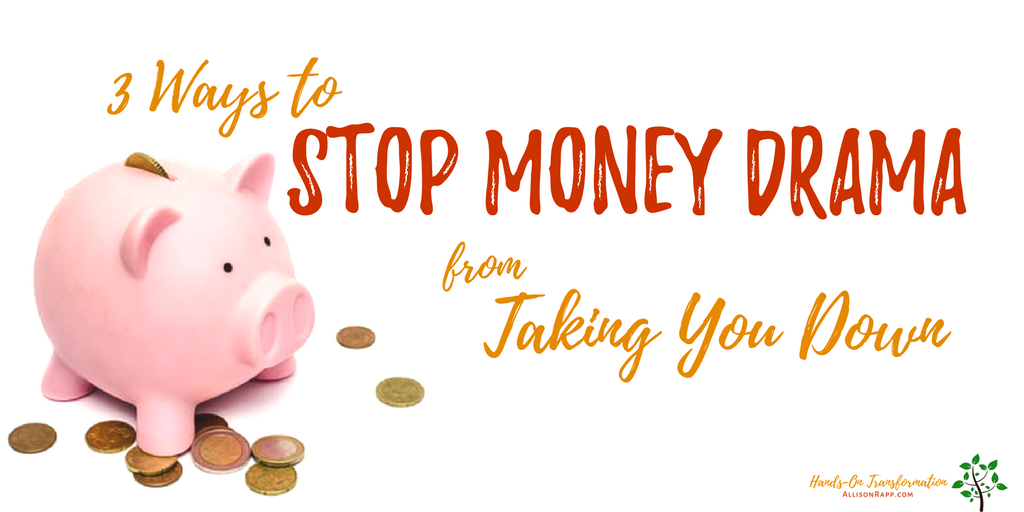Most practitioners I speak with tell me that they didn’t get into their work to make a fortune – they did it to help other people. They want to learn how to attract more clients because they really want to serve more people.
Of course, making a living wouldn’t hurt—it’s just that for most of us, it’s the side-benefit to helping people and not the primary reason we do it.
That doesn’t give you permission to ignore money!
Just because we don’t think of money first doesn’t mean we can ignore it altogether. We’ve got some problems around it, though, starting with the fact that most of us have never been taught how to have a healthy relationship with money that allows us to do good and to do well at the same time.
Because we’re conflicted about it, we tend to push money away at the same time we’re trying to build a practice.
We have a lot of subtle and not-so-subtle ways to accomplish this. Here are a few that are pretty easy to see, especially in OTHER people 🙂 and what you can do to change something that’s essentially a habit that doesn’t serve you.
1. Learn to talk about your expertise.
Many practitioners don’t step into their expertise, so their clients never really “get it” that they can be helped.
Sometimes this happens because you assess your skills by looking back toward your teachers instead of looking forward toward the clients you hope to attract. This is a big mistake, because for most of us, it will take a long, long time to become as skilled as the people who taught us. I mean, my teacher was Moshe Feldenkrais, so—realistically, what hope do I have of living up to his reputation?
But that doesn’t mean your clients have nothing to gain by working with you. In addition to taking money out of your own pocket, it’s a tremendous disservice to your clients to downplay your expertise, because those folks are not getting the help they need.
What you can do about it…
Assess your expertise realistically.
Most practitioners have only a vague idea of what their expertise looks like—and many don’t think they have enough claim to expertise to call themselves one.
If that describes you, you don’t really understand the value you bring your clients. And in that case, you can’t talk to them about what they need to know before they will agree to work with you.
It’s really critical to get a handle on what you’re here to offer your clients, so if you don’t have any idea how to look at expertise begin here with this free mini-training.
Once you get over your amazement at what you know, spend some time sinking into the feeling that realization gives you inside. Remember it and call on it when you’re working with your next client and see how it changes your attitude.
You really CAN let your light shine!
2. Stop jumping at every chance to cut your fee
Almost every practitioner who wants more clients is willing to cut his fee as soon as he sees a first-time student waver on making an appointment for the second lesson.
People tell me they want to help people and after all, since they aren’t full they have the time… and some money is better than no money. So what’s wrong with it?
Well… to be honest? Several things! Here are 3 —
The first is that you really don’t know what your student’s circumstances are.
I had an introductory session with a woman who told me she couldn’t afford what I charged, so I cut my fee drastically to make my private time affordable. Imagine my surprise a couple of months later, when a mutual friend told me how much she had enjoyed the huge pool-warming party at my client’s brand-new in-ground swimming pool!
Suddenly I understood why she couldn’t afford sessions with me… her choice was to spend thousands on a swimming pool. I felt like I got soaked without even being invited to the party!
The second is that during the time you’re working for less than your fee, you could be doing something to find clients who can pay you what you’re worth.
In fact, it’s important to use that time to build your business.
Take a moment to inhale the idea that if you’re actually being paid what you ask, you can help more people, and that’s the goal for most of us.
The third reason is that when you cut your fee, you send a message to yourself that you’re not worth it.
Send that message often enough, and you’ll begin to believe it! Begin to believe it, and you’ll be forced to lower what you ask for–and what will you do when people tell you they can’t afford THAT?
What to do instead…
Establish your fees based on your level of experience and comfort, and on the value you offer, rather than the time it takes.
Think about what others in your area charge but don’t be ruled by it. Try adding $5 or $10 dollars and see how it feels in your stomach. Increase every few months if you need to. There is no rule that says you have to charge the same fee to every client, so people can be at various stages of working their way up to your desired fee.
Find a way to give back after you are stable.
You might do this through Kiva or another charity, through volunteer work, or by offering a special price to a special person in a special situation–just know that you can’t do it with everyone or you’ll feel bad about yourself again very quickly.
Learn to deal with your clients’ concerns around money.
Very few practitioners ever go past “I can’t afford it” when they are speaking with their clients. The ones who know how to do it are able to turn a lot of the “I can’t afford it” prospective clients into committed students who come for a series of 10 lessons or more and refer their friends!
3. Disqualify yourself as a player in a money drama-of-omission
Everything is drama sometimes, but it’s not necessary to make everything dramatic.
Growing up Catholic, I learned about a lot of drama that took place under the big theme of “sins of omission” which have to do with what we should have done—but didn’t. Things like this are more about neglect than intent.
Examples in your practice could look like this:
- You don’t know how many classes your students came to, so you don’t know if they owe you money or you owe them classes.
- You don’t know your bank balance, so you bounce checks.
- You lose checks or forget to make a deposit.
- You’re living on credit.
- You know you’re not making the best impression on your clients because you need a haircut, but you tell yourself you can’t afford one.
- You can’t sleep because you’re worried about money, and when you get up you’re too tired to do your best work…
What you can do instead…
Identify the money drama situations in your life.
Once you know where the drama arises, you can decide to change one thing at a time until your money habits are more functional. That might mean you:
- Get a system for banking.
- Figure out how to track your clients.
- Balance your bank statement–regularly.
- Get help from a friend who has less money drama than you do.
- Stop playing your part in the drama by learning more about it, about yourself, about your options.
- Write your money story out so you can see it.
You don’t have to have a terrible relationship with money… but money doesn’t have the incentive to make your relationship better. If you want things to change, you’ve got the incentive and you need to take action!
]


